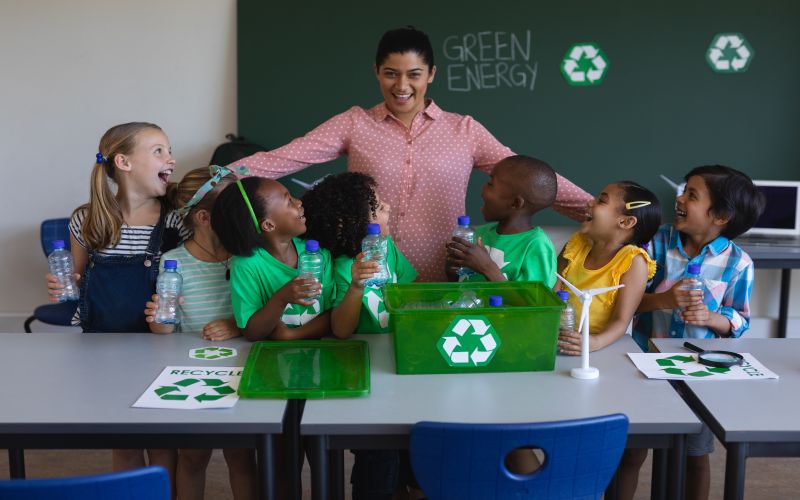My Work Experience Placement at Green Schools Project
By IOE Digital, on 5 August 2022

(Image source: wavebreak3 via Adobe Stock).
By Sakura Goto, Education Studies BA
*From the 2024/2025 academic year onwards, the Education Studies BA has been renamed the Education, Society and Culture BA.
Have you ever wondered if undergraduates on a three year course can get enough work experience before graduation? The BA Education Studies has got this covered with a new module, the Education Studies Placement Module.
About the Education Studies Placement Module
In Year two, BA Education Studies students can choose the optional module ‘Education Studies Placement Module’. This module employs ‘work-integrated learning’ – a curriculum design which exposes students to a professional work placement setting along with the formal learning (Cameron et al., 2017) to develop transferable skills and pre-professional identity among undergraduates (Jackson, 2017). During the first ten weeks of the module, students study the key academic debates regarding potential educational career fields, in which topics are divided into the three strands – Policy, Heritage and Culture, and Voluntary and Community
At the end of term one, each student chooses the strand they are interested in and are assigned to an organisation for the placement. Students then work at their allocated places in terms two and three, while attending a few workshops relating to specific skills, such as writing CV.
As a student who took the placement module, I am here to share the experience and my thoughts on participating in this module.
My Placement Experience
The organisation that I was assigned to is Green Schools Project (GSP), one of the Policy placement organisations. GSP is a social enterprise that provides schools with support and resources to develop a method for tackling the climate crisis (Greenwood, 2021; Slawson, 2020).
My placement task was to research local councils’ climate-related policy and to evaluate whether a council is likely to collaborate with or support GSP. The research was done online using websites and council reports. The outcome of the placement took the form of presentation both in person and online. As well as the presentation, we also created a spreadsheet that gave an overview of all the researched information, a group of documents that summarised the climate policies of each council in detail, a list of contacts for each council and a template email to reach out to council staff for support.
Reflection on my Placement
The following are the benefits I gained from this module.
I deepened my academic knowledge by linking it to a real-life situation
Usually, knowledge that we gain from lectures is academic and we do not get a chance to apply this knowledge in a different context. However, the placement module provides students with an opportunity to connect their academic knowledge with placement experiences. For instance, in term one, I learned about the growing complexity of the policy-making process and from the GSP placement I became able to imagine the role and the impact of GSP as an actor on the environmental policy cycle. This process of making academic knowledge live in a real-life situation made my learning more meaningful.
I developed time-management skills
Since placement hours were limited, I set an overall goal to research 30 or more councils, breaking that down into weekly goals. When building my plan, I made sure that I set a specific measurable goal with a deadline and shared that with the manager. I also used the Pomodoro technique – 25 minutes of work, following five minutes break – to measure my working hours and to maintain my motivation. With those efforts, I was able to successfully complete research on 40 councils and carry out a 15-minute presentation.
I developed collaboration and communication skills
Collaboration was particularly important and difficult in my placement because all tasks were done online. Despite my past experiences in teamwork at high school, the teamwork required in an online environment was challenging. It required some degree of autonomy and initiative compared to in-person communication. Hence, I learned to actively contact another student to check on each other’s work and projects for the final presentation.
Overview
In order to give undergraduates the ability to survive in the competitive job market, it is significant for universities, including UCL to utilise work-integrated curricula (Gerloff & Reinhard, 2019). Exposure to a professional culture in the workplace can help make students ready and confident to get into a career, as I did through the Education Studies Placement Module. Unlike other modules, the knowledge and experiences students can get from the placement module are practical and useful. I highly recommend taking it if you have the chance!
Bibliography
Cameron, C., Freudenberg, B., Giddings, J., & Klopper, C. (2017). The program risks of work-integrated learning: a study of Australian university lawyers. Journal of Higher Education Policy and Management, 40(1), 67–80. https://doi.org/10.1080/1360080x.2017.1377969
Greenwood, H. (2021, September). 2020-2021 Zero Carbon Schools Pilot Impact Report. Green Schools Project. https://www.greenschoolsproject.org.uk/wp-content/uploads/2021/09/Zero-Carbon-Schools-Pilot-Impact-Report.pdf
Jackson, D. (2017). Developing pre-professional identity in undergraduates through work-integrated learning. Higher Education, 74(5), 833–853. https://doi.org/10.1007/s10734-016-0080-2
Slawson, N. (2020, September 23). Pupil power: how students are turning schools green. The Guardian. Retrieved May 1, 2022, from https://www.theguardian.com/teacher-network/2017/apr/28/pupil-power-how-students-are-turning-schools-green
 Close
Close


